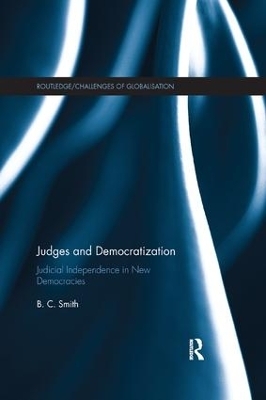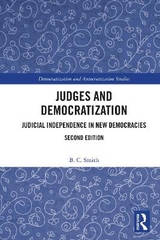
Judges and Democratization
Routledge (Verlag)
978-0-367-17372-2 (ISBN)
- Titel erscheint in neuer Auflage
- Artikel merken
Judges and Democratization is based on the premise that democracy cannot be consolidated without the rule of law of which judicial independence is an indispensable part. It pays particular attention to the restraints placed upon judicial independence, and the reforms which are being applied, or remain to be adopted, in order to guard against the different kinds of interference which prevent judicial decisions being taken in a wholly impartial way. It examines the paradox of judicial activism arising from the independence endowed upon the judiciary by post-authoritarian constitutions. The book asks how, in the context of this endowed authority, such accountability can be made compatible with the preservation of judicial independence when the concept of an accountable, independent judiciary appears to be a contradiction in terms.
This text will be of key interest to teachers and students of politics, comparative government/politics, combined politics and law, democracy and governance, human rights and democratization, and democratic development.
B. C. Smith is Emeritus Professor of Political Science and Social Policy, University of Dundee, UK.
1. The Rule of Law and Democracy
Introduction
The Rule of Law and Public Policy
The Principles of the Rule of Law
The Rule of Law and Democracy
Trends in the Rule of Law
The Rule of Law and Democratic Consolidation
Democratic Constitutions and the Rule of Law
The rule of Law and Social Inequality
2. The Rule of Law and Judicial Independence
Introduction
Impartiality
Insularity
Exclusive Competence
Compliance
Judicial Independence and Democracy
3. Undermining Judicial Independence
Introduction
Powers of Appointment to the Judiciary
Control of the Judge’s Career
Appointments to Judicial Councils
Resources
Intimidation
Limiting the Scope of Judicial Review
Exceptional Courts
Steering the Judiciary
Non-enforcement
4. Judicial Bias
Introduction
Biased Proceedings
Inefficiency
Biased Judges
Corruption
Causes of Judicial Corruption
5. Judicial Reform
Introduction
Political Competition
Civil Society
Legislative Scrutiny
Intimidation
The Scope of Judicial Review
Exceptional Courts
Enforcing Judgements
6. Reforming Judicial Behaviour
Introduction
Judicial Capacity
Efficient Judges
Unbiased Judges
Honest Judges
The Politics of Judicial Reform
7. Judicial Management
Introduction
Judicial Self-management
The Executive Model of Management
The Role of Legislatures
8. Judicial Activism
Introduction
Judicial Power
Abstract Constitutional Review
Constitutional Amendment
Testing the Legality of Policy Decisions
Testing the Constitutionality of the Political Process
Judicial Review of Administrative Action
Executive Suppression of Judicial Independence
Judicial Activism and Democracy
9. Judicial Accountability
Introduction
Demands for Judicial Accountability
The Concept of Accountability
Accountability for Policy Review
Accountability through Self-Management
Accountability for Corruption
Accountability for Bias
Accountability for Ineffectiveness
Accountability for Impeded Access to Justice
Elected Judges
Transparency
10. Conclusion: The Dilemma of Judicial Independence
Introduction
The Struggle for Judicial Independence
Judicial Reform
A Universal Rule of Law
Independence and Accountability
The Rule of Law’s Fragility
| Erscheinungsdatum | 09.01.2019 |
|---|---|
| Reihe/Serie | Democratization and Autocratization Studies |
| Zusatzinfo | 1 Tables, black and white; 4 Line drawings, black and white; 4 Illustrations, black and white |
| Verlagsort | London |
| Sprache | englisch |
| Maße | 156 x 234 mm |
| Gewicht | 340 g |
| Themenwelt | Recht / Steuern ► Allgemeines / Lexika |
| Recht / Steuern ► EU / Internationales Recht | |
| Sozialwissenschaften ► Politik / Verwaltung ► Politische Systeme | |
| ISBN-10 | 0-367-17372-7 / 0367173727 |
| ISBN-13 | 978-0-367-17372-2 / 9780367173722 |
| Zustand | Neuware |
| Informationen gemäß Produktsicherheitsverordnung (GPSR) | |
| Haben Sie eine Frage zum Produkt? |
aus dem Bereich



